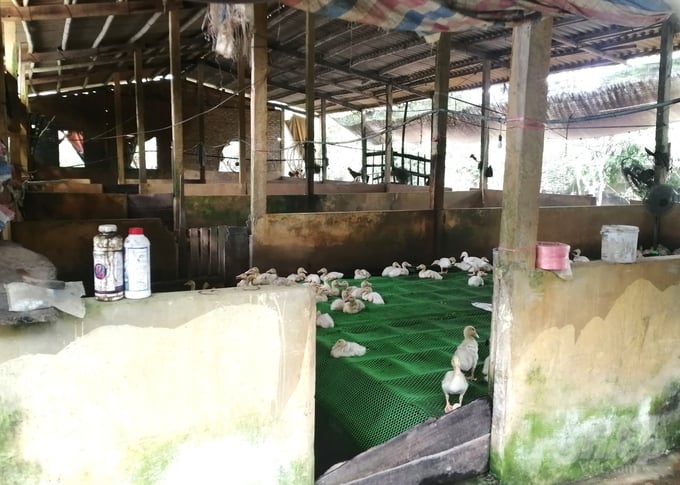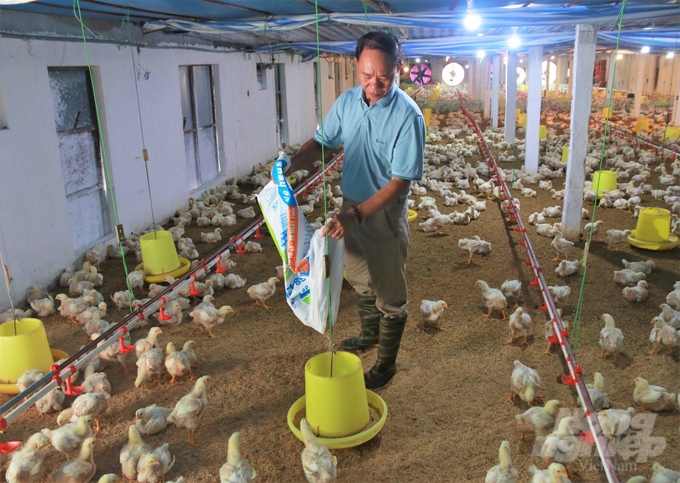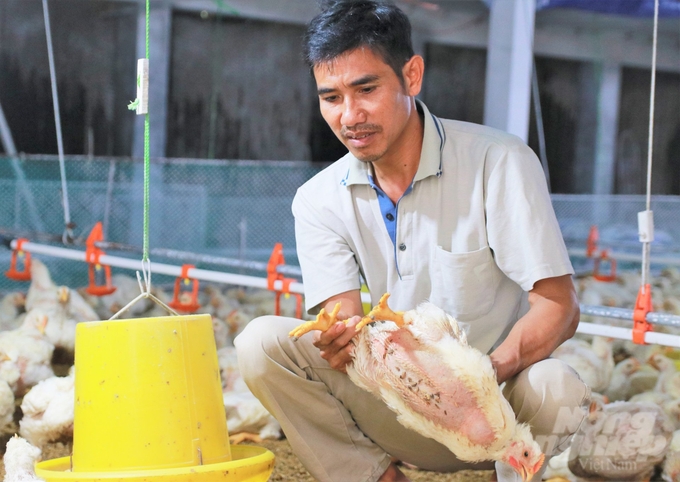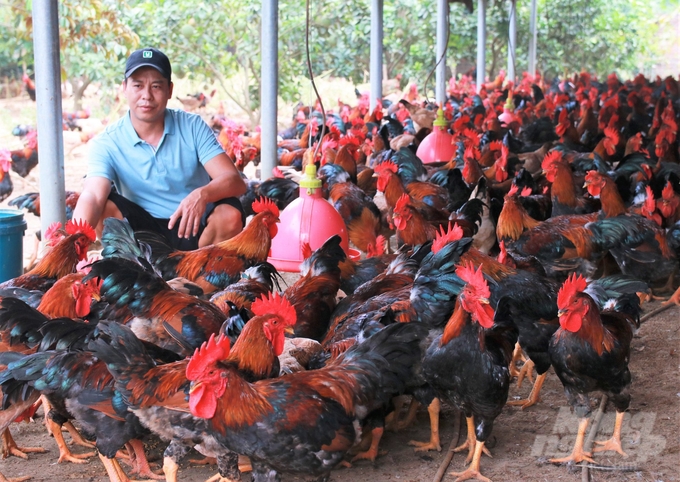June 17, 2025 | 20:59 GMT +7
June 17, 2025 | 20:59 GMT +7
Hotline: 0913.378.918
June 17, 2025 | 20:59 GMT +7
Hotline: 0913.378.918
Editorial Board's note: Diseases and epidemics on livestock herds, in addition to competitive pressure from the integration process, have compelled the Vietnamese animal husbandry to engage in a revolutionary shift. After 17 years of membership in the WTO, the livestock production industry's assets and weaknesses have become apparent.
In addition to being the center of livestock production in the Red River Delta, the Binh Luc district of Ha Nam province is also the largest livestock market in the country. During the golden age of pig husbandry, its popularity was evident.
Thanks to winning the pig price, the living standards of Binh Luc producers improved. Everyone began to believe that there were as many millionaires and billionaires in Binh Luc as mushrooms.
However, the image appears artificial as the "dead acupuncture point" of fragmented and insubstantial household agriculture. The supply exceeded demand, resulting in the collapse of a number of agricultural households due to rising costs and the spread of disease.

Mr. Hoang Trung Hai, village 5, Ngoc Lu commune, is worried because he doesn't know how long he can stay with pig farming. Photo: Hoang Anh.
Mr. Do The Trong, the director of the Binh Luc Agriculture and Rural Development Office, stated that the price of piglets once exceeded 200,000 heads per litter but has since dropped by half, concentrating on farms with strong financial resources or animal feed suppliers.
Mr. Trong explained the cause by stating that livestock production in Binh Luc has declined continuously since 2017 when pig prices began to rise.
In 2018 and 2019, the outbreaks of foot-and-mouth disease and African swine fever decimated the already struggling agricultural communities. When the epidemic subsided temporarily, households attempting to restore their livestock were met with a recent tempest of record-high animal feed prices. The majority of livestock producers were incapacitated by the succession of fatal strikes.

Many pig-raising households in Binh Luc have had to abandon their barns and switch to raising ducks on a limited basis. Photo: Trung Quan.
We discovered Mr. Hoang Trung Hai's family in Village 5, Ngoc Lu commune, as one of the households still attempting to maintain their profession. Mr. Hai lamented that despite the modest size of his family's barn and the fact that he worked as a brand agent for locals, for a time everything ran efficiently.
After the price tempest and African swine fever ravaged, the entire pig herd had to be annihilated, and a substantial amount of capital was also lost. The family's livestock husbandry was compelled to cease entirely, and it wasn't until last year that they had the courage to begin surfing again using funds from the previous state's assistance in destroying diseased hogs.
Mr. Hai believed that no family would chance providing money to purchase tiny pigs to rear, but that surfing farming was equally hazardous. When catching a herd of piglets at a high price and raising them for about a month, the selling price is sometimes low. If you continue to rear them, they will become too elderly and expensive, and selling them will result in a loss of hundreds of millions of VND.

Mr. Luu Xuan Lieu, Trai Lang village, Co Dong commune (Son Tay, Hanoi) said that if the price of input materials and chicken selling prices are not stably controlled, the risk of farmers abandoning their cages is very high. Photo: Trung Quan.
African swine fever came out in 2019-2020, necessitating the destruction of roughly 30 percent of Hanoi's total pig population. Numerous livestock households find themselves in a difficult circumstance, attempting to eliminate the issue in any way possible. Among them, a number of households converted from rearing pigs to chickens in the expectation that chickens would be riskier.
Mr. Luu Xuan Lieu of Trai Lang village, Co Dong commune (Son Tay) reared 5,000 white-feathered chickens and revealed that in the past, virtually every household in Co Dong commune kept pigs. One can count on one hand the number of households that still rear livestock due to epidemics. In order to continue earning a livelihood, many households have turned to poultry farming, but the results have been disappointing.

Developing livestock joint ventures is considered a positive direction in the current context. Photo: Trung Quan.
According to Mr. Lieu, the majority of households that continue to raise livestock are seasoned farmers who are resistant to abrupt market shifts. Moreover, they are the ones who took advantage of the opportunity to accumulate a small amount of capital during the "peak" period so that they still have investment capital. The second objective that can be increased with incentives from feed factories is cereal agents.
Mr. Lieu determined that an investment of more than 1 billion VND is required to reopen a poultry farm with a capacity of 10,000 chickens or more. Even though the price of poultry fluctuates daily, the sale of chickens is never sufficient to cover investment costs.
Mr. Nguyen Van Tuan of Xuan Linh village, Thuy Xuan Tien commune (Chuong My) currently raises approximately 2,000 poultry of various colors. Everyone acknowledges that raising livestock is challenging, but for many families, it is a means of subsistence. As a family, they have invested a great deal of money in the farm, so regardless of the difficulties, they are determined to persevere.

According to Mr. Nguyen Van Tuan, Xuan Linh Village, and Thuy Xuan Tien commune (Chuong My), raising colored chickens also faces many difficulties. Photo: Trung Quan.
In the context of unstable livestock production, numerous households have pursued joint ventures and business partnerships to alleviate pressure. In the contemporary context, this is viewed as a positive development. However, there are still aspects of these forms that cause many households concern and hesitation.
Specifically, when farming is outsourced to businesses, producers must have a cage system that satisfies the business's standards. The enterprise will invest all input costs (with the exception of electricity) and pay the farmer approximately 5,000 VND per kilogram. However, in order for producers to receive this compensation, the companies impose stringent requirements and standards. If a household is careful, it will earn a profit, but if it is careless, it will continue to incur losses.
Translated by Linh Linh

(VAN) The results of national programs are essential for establishing a contemporary livestock sector that is well-equipped to meet the demands of both domestic and international markets, with robust biosafety standards.

(VAN) The UNESCO Global Geopark revalidation of Non nuoc Cao Bang and the transition to a two-tier administrative model are presently undergoing a pivotal moment in Cao Bang, the northernmost province of Vietnam.
/2025/06/13/5330-2-004539_953.jpg)
(VAN) Changing policy mindset and removing investment barriers are urgent requirements to open up new development space for enterprises in the agricultural sector.

(VAN) The areas include the restoration of five million hectares of marine ecosystems.

(VAN) Dr. Le Van Nguyen, Director of the Institute of E-Commerce Management (ECM), emphasizes the potential for green development through the cultivation of fruit trees, particularly in provinces such as Son La.

(VAN) VAAS and numerous Vietnamese enterprises have signed cooperation agreements with Japanese partners to promote agricultural technology and trade connectivity.
/2025/05/29/5625-12-214801_567.jpg)
(VAN) Provincial mergers in the Mekong Delta promise to streamline administration, expand inter-provincial raw material areas, and foster close linkages in agricultural value chains, benefiting both businesses and cooperatives.